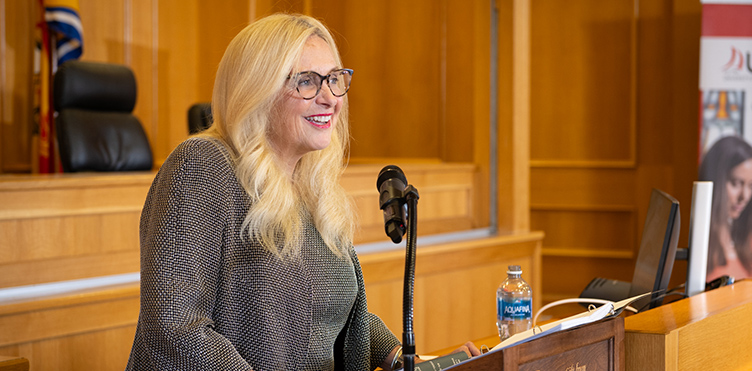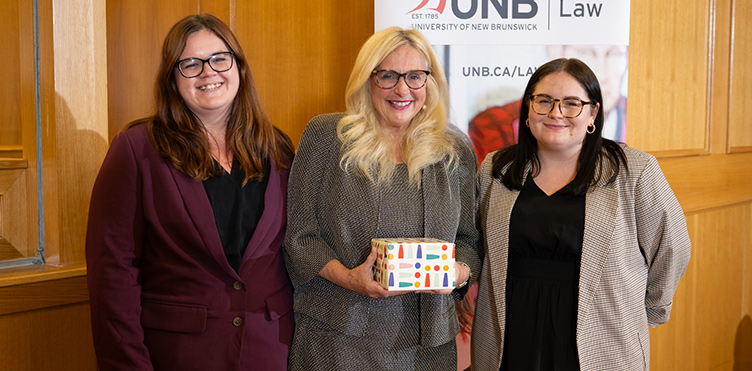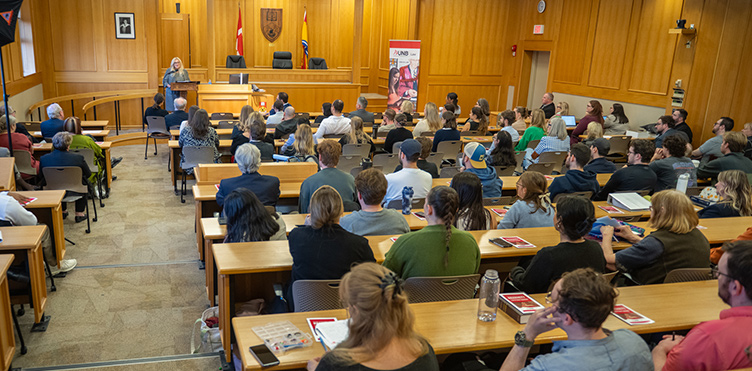
In late October, Justice Sheilah L. Martin of the Supreme Court of Canada delivered a powerful Viscount Bennett Memorial Lecture at the University of New Brunswick (UNB).
Justice Martin—whose distinguished career has spanned the roles of professor, barrister, trial court judge and now, Supreme Court justice—has examined complex and high-profile wrongful conviction cases, including that of David Milgaard and Thomas Sophonow.
In the following Q&A, third-year UNB Law student and mother of four, Julia Belanger, asks Justice Martin to share insights on her motivations, career highlights and views on access to justice.
Belanger, originally from the Ottawa-Gatineau area, moved to New Brunswick to attend UNB’s Faculty of Law and will begin clerking for the New Brunswick Court of Appeal following her graduation in the spring of 2025. Through UNB’s Legal Innovation Lab and Pro Bono Students Canada she is addressing access to justice in New Brunswick and beyond.

Julia Belanger: Justice Martin, what motivated you to pursue a career in law?
Justice Martin: I had multiple motivations. The first time I got seriously interested in being a lawyer was after reading about the trial of Steven Truscott. I learned there was a possibility of system and human failure in our justice system. That was a shocking proposition to me as a teenager. I wanted to learn more and understand how a system meant to produce justice could produce the opposite.
I also wanted to make a decent living and have something that would sustain my intellectual curiosity.
Ultimately, I wanted to help people solve real-life problems that stood in the way of them being their best selves. I was motivated by trying to use law in a way that helped people have better lives.
Julia Belanger: Has your perspective on access to justice changed since joining the Supreme Court?
Justice Martin: A person’s understanding of access to justice and equal justice for all changes over time and with experience. I’ve been a professor, a barrister, a trial court judge and now I’m at the Supreme Court. One thing you learn is the complexity of the issues. But complexity cannot be a reason not to tackle real problems. It should spur action.
We need to ensure the system is responsive to the user, which means focusing on the public and consumers.
Julia Belanger: What is your favourite memory from your legal career?
Justice Martin: That’s a tough one, like picking a favourite child! I guess I could say those days where I knew I worked very hard on something, was prepared, and could speak with authority because of my diligent preparation. Those days where it mattered that I was involved—where I felt I made a contribution—are my favourite memories. It’s not just about winning but about the pride of a hard job well done.

Julia Belanger: As someone who also has children, one thing you spoke about at the law lecture that really resonated with me was when David Milgard brought pizza for your kids after his release. As a mother and someone who practiced law while raising children, what advice would you give to mothers entering the legal profession?
Justice Martin: First, I’d say, ‘Great choice!’ We’ve worked hard to make the legal profession more hospitable to women and mothers. From maternity policies to part-time work and income replacement, we’ve made strides. My advice is to relax and not be harsh on yourself. Understand that you are doing two full-time jobs. Define your own balance.
Julia Belanger: I remember when my daughter climbed onto my lap during a virtual meeting and fell asleep. Everyone thought it was adorable, and it showed me how much the profession has evolved to accommodate family life. What suggestions would you give to men in the legal profession to support gender equality?
Justice Martin: Gender equality is about mutual respect and sharing life’s responsibilities. Encourage and support each other. Create circumstances where everyone has an equal capacity to do well. Understand that people have multiple obligations, whether to their children, parents or other important aspects of their lives. Structurally support this balance.
Julia Belanger: What do you see as the biggest access to justice issue in Canada and how can the legal profession improve it?
Justice Martin: The biggest issue is that we’re renovating rather than innovating. We’re adding to a system instead of rethinking it from the ground up. We need to create systems based on the needs of the people using them. Lawyers have the critical abilities to diagnose problems and argue for and against different models. We need the courage to make changes, experiment and see if they improve things. We should be bolder and open to new practices.
Julia Belanger: Chief Justice Marc Richard often talks about the need for an inquisitorial system in family law instead of an adversarial one. It’s a great example of how we can look at something that’s not working and try something different. Thank you so much for your time, Justice Martin. Is there anything else you’d like to add?
Justice Martin: Just to wish you well, Julia. You’re very impressive with all you do at UNB—your pro bono work and raising four children. Keep using your energy for good.